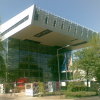Programme
- Accepted Papers
- Keynote Speakers
- Technical Programme
- Workshops
Keynote Speakers
In the following you will find information about the keynote speakers of the Networking 2009 conference.
Paul Francis, MPI Saarbrücken (recently Cornell University)

- Date:
- Tuesday, 12 May, 9:00 - 9:45
- Title:
- A Dirty-Slate Approach to Scaling BGP

- Abstract:
- It is generally accepted that a "clean slate" redesign of the Internet is needed to solve problems like routing scalability. Given that such designs are unlikely to ever be deployed, we believe it is equally important to find solutions that are economically attractive. In this talk, we describe Virtual Aggregation, a technique that allows us to shrink hardware routing tables by at least an order-of-magnitude, that requires no changes to routing protocols or even to router software, and that can be deployed autonomously by individual ISPs. The economic motivation behind Virtual Aggregation is that it allows ISPs to extend the lifetime of their existing router base by years. We describe how Virtual Aggregation works, show performance estimates based on a measurement study done on a large Tier-1 ISP, and describe how this work has led to IETF proposals.
- About the speaker:
- Paul Francis is a tenured faculty at the Max Planck Institute for Software Systems in Germany. Paul has held research positions at Cornell University, ACIRI, NTT Software Labs, Bellcore,and MITRE, and was Chief Scientist at two Silicon Valley startups. Paul's research centers around routing and addressing problems in the Internet and P2P networks. Paul's innovations include NAT, shared-tree multicast, the first P2P multicast system, the first DHT (as part of landmark routing), and Virtual Aggregation.
Paul Kühn, University of Stuttgart

- Date:
- Wednesday, 13 May, 9:00 - 9:45
- Title:
- Development of Global Communications - On the Path to an All-Embracing
Information Infrastructure

- Abstract:
- Microelectronic choices, optical and wireless communications and powerful software control functions have shown a dramatic improvement and an unparalleled development which allows nowadays that literally all human beings could be interconnected and, beyond that, all objects of our environment could be included forming a huge global system for information and communication. The question arises how such complex systems will develop in the future and how such systems can be controlled. The keynote addresses the main arising factors of this development as which technical challenges we are going to be faced with, which new solutions will be visible and which threats and risks are coming up with these developments. In the presentation, some specific problems will be addressed which are typical for this development as distributed control and self-organization, mobility, privacy and controllability, directing to a major paradigm shift.
- About the speaker:
- Paul Kuehn received the Diploma and Dr.-Ing. degrees from the University of Stuttgart in 1967 and 1972, respectively. He guided a research team on performance modelling of communication and computer networks. After an industrial experience at AT & T Bell Laboratories on data network development, he became a professor for communications and computer engineering at the University of Siegen (1978-1982) and the University of Stuttgart where he has been heading the Institute of Communication Networks and Computer Engineering since then. He and his team have contributed to the development of new architectures and protocols for high-speed and mobile networks, optical networks, signalling control, performance modelling and simulation, security and privacy through research fundings by the German Research Council DFG, the Federal Ministry of Research and Technology, the European Union and industrial cooperations. Professor Kuehn received honorary doctoral degrees from Lund Institute of Technology (Sweden) and the Technical University of Dresden. He was appointed to the Heidelberg Academy of Science, the National Academy Leopoldina and the new Technical Academy acatech. He was awarded Fellow by the IEEE Communications Society in 1989, honorary Senator by the University of Mannheim, the Ordre Chevalier des Palmes Académiques by the French Government, the Eduard-Rhein-Prize for his contributions to teletraffic theory, and the Columbus Gold Medal by the City of Genova (Italy) for his contributions to telecommunications. From 1991 to 2007, he was Chairman of the International Advisory Council of the International Teletraffic Congress. He held various academic positions as Dean, Study Dean at the University of Stuttgart and Founding Dean at the new German University in Cairo (Egypt).
Mario Gerla, UCLA

- Date:
- Thursday, 14 May, 9:00 - 9:45
- Title:
- Vehicular Urban Sensing: Dissemination and Retrieval
- Abstract:
- There has been growing interest in vehicle to vehicle communications for a broad range of applications ranging from safe driving to content distribution, advertising, commerce and games. One emerging application is urban sensing. Vehicles monitor the environment, classify the events, e.g., license plates, pollution readings, etc. and exchange metadata with neighbors in a peer-to-peer fashion, creating a distributed index from which mobile users can extract different views. For instance, the Department of Transportation captures traffic statistics; the Department of Health monitors pollutants, and; Law Enforcement Agents investigate crimes. Mobile, vehicular sensing differs significantly from conventional wireless sensing. Vehicles have no strict limits on battery life, processing power and storage capabilities. Moreover they can generate enormous volumes of data, making conventional sensor data collection inadequate. In this talk we firs review popular V2V applications and then introduce MobEyes, a middleware solution that diffuses data summaries to create a distributed index of the sensed data. We discuss the challenges of designing and maintain such a system, from information dissemination to harvesting, routing and privacy.
- About the speaker:
- Dr. Gerla received his Engineering degree from the Politecnico di Milano, Italy, in 1966 and the M.S. and Ph.D. degrees from UCLA in 1970 and 1973. He became IEEE Fellow in 2002. At UCLA, he was part of a small team that developed the early ARPANET protocols under the guidance of Prof. Leonard Kleinrock. He worked at Network Analysis Corporation, New York, from 1973 to 1976, transferring the ARPANET technology to several Government and Commercial Networks. He joined the Faculty of the Computer Science Department at UCLA in 1976, where he is now Professor. At UCLA he has designed and implemented some of the most popular and cited network protocols for ad hoc wireless networks including distributed clustering, multicast (ODMRP and CODECast) and transport (TCP Westwood) under DARPA and NSF grants. He has lead the $12M, 6 year ONR MINUTEMAN project, designing the next generation scalable airborne Internet for tactical and homeland defense scenarios. He is now leading two advanced wireless network projects under ARMY and IBM funding. In the commercial network scenario, with NSF and Industry sponsorship, he has led the development of vehicular communications for safe navigation, urban sensing and location awareness. A parallel research activity covers personal P2P communications including cooperative, networked medical monitoring.



